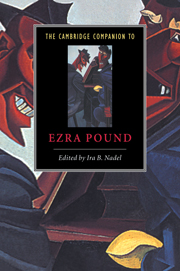Book contents
- Frontmatter
- 1 Introduction Understanding Pound
- 2 Pound and the making of modernism
- 3 Early poetry 1908-1920
- 4 Early Cantos I-XLI
- 5 Middle Cantos XLII-LXXI
- 6 Late Cantos LXXII-CXVII
- 7 Beyond The Cantos
- 8 The texts of The Cantos
- 9 Pound as critic
- 10 Pound as translator
- 11 Pound and the visual arts
- 12 Pound and music
- 13 Pound's politics and economics
- 14 Pound, women and gender
- 15 Pound and antisemitism
- Further reading
- Index
4 - Early Cantos I-XLI
Published online by Cambridge University Press: 28 May 2006
- Frontmatter
- 1 Introduction Understanding Pound
- 2 Pound and the making of modernism
- 3 Early poetry 1908-1920
- 4 Early Cantos I-XLI
- 5 Middle Cantos XLII-LXXI
- 6 Late Cantos LXXII-CXVII
- 7 Beyond The Cantos
- 8 The texts of The Cantos
- 9 Pound as critic
- 10 Pound as translator
- 11 Pound and the visual arts
- 12 Pound and music
- 13 Pound's politics and economics
- 14 Pound, women and gender
- 15 Pound and antisemitism
- Further reading
- Index
Summary
Here begins the great unwieldy poem, all light and mud, to which Ezra Pound devoted much of his life. It was the work of a poet too ambitious, too afraid of being cramped, to work according to a plan. Instead of a plan, Pound devised a strategy for creating a self-scrutinizing text, continually extending itself, ramifying outward, as it groped to comprehend its own prior meanings, to improvise new networks of connection, and to assimilate new material: a text shaped like a developing brain. New Cantos form themselves out of schemes to make sense of old Cantos: so the story of The Cantos comprises two intertwined stories, one concerning Pound's writing of the poem, the other concerning Pound's interpretations of what he had already written.
This twin story begins in 1915, when Pound was thirty years old. He was living in London, writing critical essays and reviews, shaping the modernist movement by propagandizing Eliot and other poets; and he felt that it was time to make a contribution of his own, by composing a grand poem worthy of Homer and Dante. As early as 1909, Pound told his mother that he intended to write an epic; but he was not immediately certain how to proceed.
- Type
- Chapter
- Information
- The Cambridge Companion to Ezra Pound , pp. 59 - 91Publisher: Cambridge University PressPrint publication year: 1999
- 1
- Cited by

